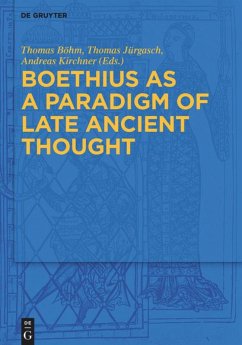
Themistius and the Power of Words
Philosophy and Rhetoric on the Crossroad of Ages and Languages
Herausgegeben: Coda, Elisa
Versandkostenfrei!
Erscheint vorauss. Dezember 2025
93,99 €
inkl. MwSt.
Themistius is a case in point for the study of the transmission of Ancient Philosophy to later eras. This book features 15 contributions on his thought and on the paths along which pagan culture became palatable first for a Christian elite, then for a Muslim one. It also shows that his interpretations and thinking are better understood against the background of the rise of a new conception of philosophy in what we label nowadays ?"Late Antiquity".













